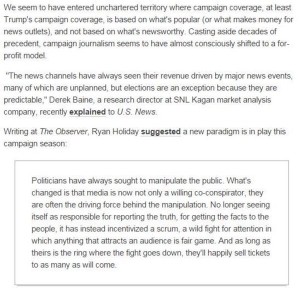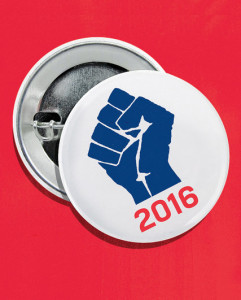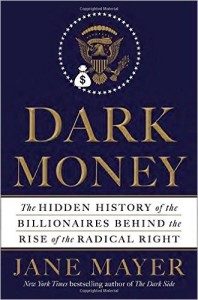Media Matters
March 12, 2016What’s different about this election? A shift to a for-profit model of campaign journalism…
Revolution…not evolution.
New York Times:
(Editorial Board)
‘Revolutions are typically bottom-up, not top-down, events. Mr. Sanders’s campaign is powered by $30 contributions and an army of young volunteers, but there are not enough elected office holders in Congress or in statehouses to carry out his revolution through new laws or policies. And that’s the big difference between running an inspiring campaign and actually governing.
[…]
The mistake is thinking that we get behind a progressive candidate for president, and that will solve all our problems.
[…]
Mr. Sanders’s own political career illustrates what can happen when a revolutionary has no ground troops. For 25 years in Congress, Mr. Sanders has held fast to his progressive message and principles. But he hasn’t gotten many big things done. As an uncompromising political independent, his outsider status has largely prevented him from attracting the support that would be needed among Democrats to turn into law his liberal ideals on health care, on college education and on fighting poverty and climate change.
One need only look to the legislative setbacks for President Obama to see what happens when transformative ideas hit an intransigent Congress.
[…]
As a result, Mr. Obama has presided over the biggest loss of congressional Democrats in modern political history — 13 Senate seats and 69 House seats. Republicans now hold 31 governorships, many more than when Mr. Obama took office. State legislatures, too, have had a surge in Republican control.
The Democratic Party recognizes the problem, but whether it can alter the trend is another matter. Raul Alvillar, the national political director for the Democratic National Committee, says the party has demographics on its side, as a wave of young people reach voting age, and the party, through a series of training initiatives, is trying to inspire them to run for local office.
Ilya Sheyman, the executive director of MoveOn.org, a political advocacy and action group that has endorsed Mr. Sanders, views his candidacy as “a reaction to the Tea Party standing in the way of everything the president wants to do, and a coming of age of a new wave of voters.” He is confident that movements like Occupy Wall Street, the Fight for $15 minimum-wage campaign, and Black Lives Matter will eventually propel young progressives into elective office. He credits Occupy Wall Street with putting the issue of wealth inequality into public discourse, and “now I think what we’re seeing is the electoralization of these issues.”
Mr. Sanders’s supporters say his election will inspire more such candidacies, giving him the congressional backup he needs. But given Democrats’ problems on the state and local level, that could take years — and that’s evolution, not revolution.’
Seth Godin.
‘Are there primary voters who say, “I know that he craves attention, hustling and manipulating to sell emotional promises, not realistic action, but I’m going to vote for him anyway, because it makes me feel powerful to do so…”?
As soon as that self-awareness kicks in, it’s possible to be more discerning about what you believe and why.
Or are there mindful people who say, “there’s no clear right answer in this conflict, but my people, my folks, we have always supported this side, so I’m going to keep doing that, because breaking with them is too painful…”?
As soon as you ask that question, it’s a lot easier to have a civil, productive conversation, because instead of wearing yourself out arguing tropes, you can talk about the actual issue, which is belonging to a tribe. We can talk about how we work through the cultural change to get to a new place, not have an argument about history.
Marketing works. It’s powerful. We’re able to acknowledge that and see it for what it is without giving up what we choose to believe.
We can create better decisions and more amity by being clear with ourselves and others about how marketing is changing what we believe (and vice versa).
It’s a lot harder to be manipulated if you accept that there’s a manipulator, and it’s a lot easier to see a path forward if you acknowledge that you weren’t looking for one before.’
What does $90 (B) buy?
“Mayer is. . . [a] writer whose reporting can leave a reader breathless. . . . I urge you to read Dark Money.”
—Bill Moyers
“Jane Mayer’s Dark Money is utterly brilliant and chilling — no matter how much you think you already know. . . . Read it!”
—Naomi Klein, bestselling author of The Shock Doctrine: The Rise of Disaster Capitalism and This Changes Everything: Capitalism vs the Climate
“Jane Mayer’s Dark Money. . . is absolutely necessary reading for anyone who wants to make sense of our politics. Lay aside the endless punditry about Donald’s belligerence or Hillary’s ambition; Mayer is telling the epic story of America in our time.”
—The New York Review of Books
“Mayer believes that the Koch brothers and a small number of allied plutocrats have essentially hijacked American democracy, using their money not just to compete with their political adversaries, but to drown them out. . . . Dark Moneyemerges as an impressively reported and well-documented work. . . . ”
—From the cover of the Times Book Review
“Revelatory. . .persuasive, timely and necessary. . . . [O]nly the most thoroughly documented, compendious account could do justice to the Kochs’ bizarre and Byzantine family history and the scale and scope of their influence.”
—The New York Times
“[Dark Money] could inspire a more intense discussion about the impact of this wealthy conservative cadre on the Republican Party and the recent course of American politics.”
—Washington Post
“[B]ombshells explode in the pages of Dark Money, Jane Mayer’s indispensible new history . . . .combines her own research with the work of scores of other investigators, to describe how the Kochs and fellow billionaires like Richard Scaife have spent hundreds of millions to ‘move their political ideas from the fringe to the center of American political life.’”
—The Guardian
—
‘The network has brought together some of the richest people on the planet. Their core beliefs—that taxes are a form of tyranny; that government oversight of business is an assault on freedom—are sincerely held. But these beliefs also advance their personal and corporate interests: Many of their companies have run afoul of federal pollution, worker safety, securities, and tax laws.
The chief figures in the network are Charles and David Koch, whose father made his fortune in part by building oil refineries in Stalin’s Russia and Hitler’s Germany. The patriarch later was a founding member of the John Birch Society, whose politics were so radical it believed Dwight Eisenhower was a communist. The brothers were schooled in a political philosophy that asserted the only role of government is to provide security and to enforce property rights.
When libertarian ideas proved decidedly unpopular with voters, the Koch brothers and their allies chose another path. If they pooled their vast resources, they could fund an interlocking array of organizations that could work in tandem to influence and ultimately control academic institutions, think tanks, the courts, statehouses, Congress, and, they hoped, the presidency. Richard Mellon Scaife, the mercurial heir to banking and oil fortunes, had the brilliant insight that most of their political activities could be written off as tax-deductible “philanthropy.”
These organizations were given innocuous names such as Americans for Prosperity. Funding sources were hidden whenever possible. This process reached its apotheosis with the allegedly populist Tea Party movement, abetted mightily by the Citizens United decision—a case conceived of by legal advocates funded by the network.’ (From Amazon)



